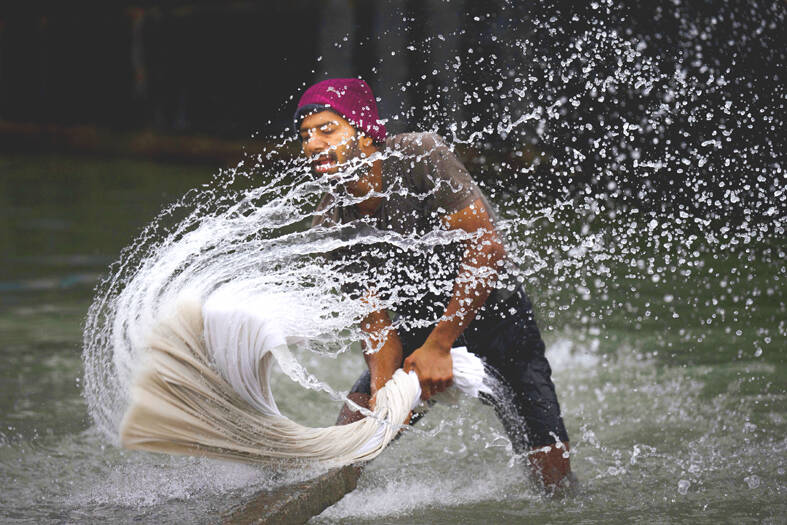A report issued on the eve of the first major UN conference on water in more than 45 years says 26 percent of the world’s population does not have access to safe drinking water and 46 percent lacks access to basic sanitation.
The UN World Water Development Report 2023, released on Tuesday, painted a stark picture of the huge gap that needs to be filled to meet UN goals to ensure all people have access to clean water and sanitation by 2030.
Richard Connor, editor-in-chief of the report, told a news conference that the estimated cost of meeting the goals is between US$600 billion and US$1 trillion a year.

Photo: AP
However, equally important is forging partnerships with investors, financiers, governments and climate change communities to ensure that money is invested in ways to sustain the environment and provide potable water to the 2 billion people who do not have it and sanitation to the 3.6 million in need, he said.
Water use has been increasing globally by about 1 percent per year over the past 40 years “and is expected to grow at a similar rate through 2050, driven by a combination of population growth, socioeconomic development and changing consumption patterns,” the report says.
Connor said that actual increase in demand is happening in developing countries and emerging economies where it is driven by industrial growth, especially by the rapid increase in the population of cities.
With agriculture using 70 percent of all water globally, irrigation for crops has to be more efficient — as it is in some countries that now use drip irrigation, which saves water, he said.
“That allows water to be available to cities,” he said.
As a result of climate change, “seasonal water scarcity will increase in regions where it is currently abundant — such as Central Africa, East Asia and parts of South America — and worsen in regions where water is already in short supply, such as the Middle East and the Sahara in Africa,” the report says.
On average, “10 percent of the global population lives in countries with high or critical water stress,” and up to 3.5 billion people live under conditions of water stress at least one month a year, the report says.

DEFENDING DEMOCRACY: Taiwan shares the same values as those that fought in WWII, and nations must unite to halt the expansion of a new authoritarian bloc, Lai said The government yesterday held a commemoration ceremony for Victory in Europe (V-E) Day, joining the rest of the world for the first time to mark the anniversary of the end of World War II in Europe. Taiwan honoring V-E Day signifies “our growing connections with the international community,” President William Lai (賴清德) said at a reception in Taipei on the 80th anniversary of V-E Day. One of the major lessons of World War II is that “authoritarianism and aggression lead only to slaughter, tragedy and greater inequality,” Lai said. Even more importantly, the war also taught people that “those who cherish peace cannot

STEADFAST FRIEND: The bills encourage increased Taiwan-US engagement and address China’s distortion of UN Resolution 2758 to isolate Taiwan internationally The Presidential Office yesterday thanked the US House of Representatives for unanimously passing two Taiwan-related bills highlighting its solid support for Taiwan’s democracy and global participation, and for deepening bilateral relations. One of the bills, the Taiwan Assurance Implementation Act, requires the US Department of State to periodically review its guidelines for engagement with Taiwan, and report to the US Congress on the guidelines and plans to lift self-imposed limitations on US-Taiwan engagement. The other bill is the Taiwan International Solidarity Act, which clarifies that UN Resolution 2758 does not address the issue of the representation of Taiwan or its people in

Taiwanese Olympic badminton men’s doubles gold medalist Wang Chi-lin (王齊麟) and his new partner, Chiu Hsiang-chieh (邱相榤), clinched the men’s doubles title at the Yonex Taipei Open yesterday, becoming the second Taiwanese team to win a title in the tournament. Ranked 19th in the world, the Taiwanese duo defeated Kang Min-hyuk and Ki Dong-ju of South Korea 21-18, 21-15 in a pulsating 43-minute final to clinch their first doubles title after teaming up last year. Wang, the men’s doubles gold medalist at the 2020 and 2024 Olympics, partnered with Chiu in August last year after the retirement of his teammate Lee Yang

The Philippines yesterday criticized a “high-risk” maneuver by a Chinese vessel near the disputed Scarborough Shoal (Huangyan Island, 黃岩島) in a rare incident involving warships from the two navies. The Scarborough Shoal — a triangular chain of reefs and rocks in the contested South China Sea — has been a flash point between the countries since China seized it from the Philippines in 2012. Taiwan also claims the shoal. Monday’s encounter took place approximately 11.8 nautical miles (22km) southeast” of the Scarborough Shoal, the Philippine military said, during ongoing US-Philippine military exercises that Beijing has criticized as destabilizing. “The Chinese frigate BN 554 was